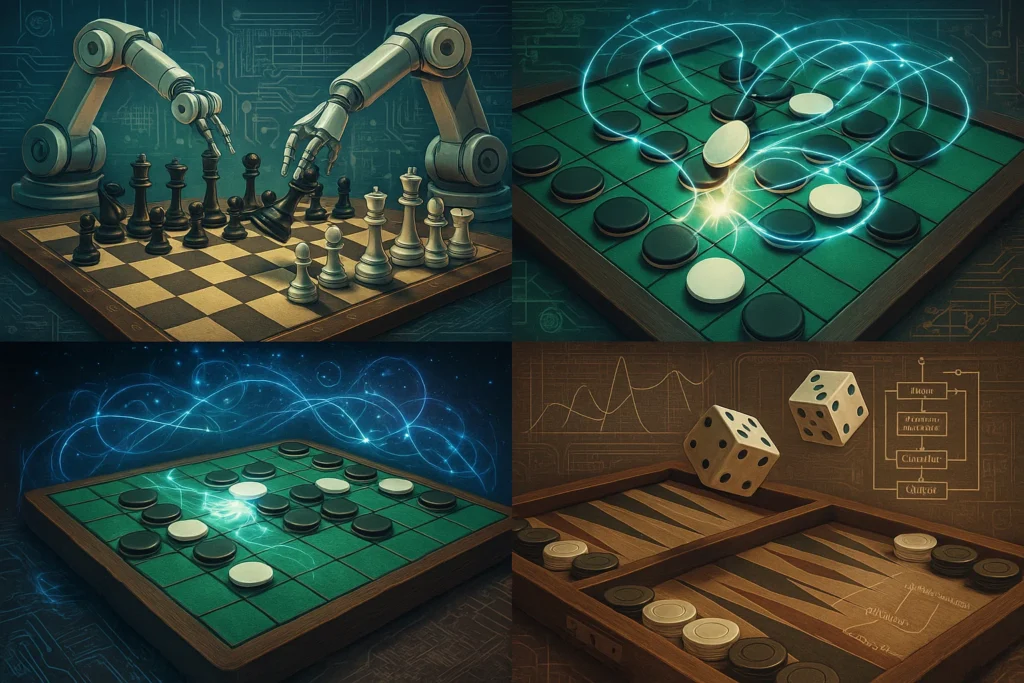Before AI tackled real-world problems, it learned from games. Strategic, mathematical, and sometimes even luck-based, classic games offered ideal testing grounds for early artificial intelligence. Let’s explore the titles that helped shape the foundations of modern machine learning — each with its own twist in the AI story.
Table of Contents
Chess: The Rational Machine’s First Trial
Few games are as iconic in the AI world as chess. With fixed rules, perfect information, and deep strategy, it became the first serious benchmark for computational intelligence.
Unusual fact:
The very first academic paper on machine intelligence — by Claude Shannon in 1950 — proposed how a computer could play chess.
Why chess mattered to AI:
- Provided a framework to test brute-force search, evaluation functions, and tree pruning (like alpha-beta pruning).
- In 1997, IBM’s Deep Blue defeated world champion Garry Kasparov, marking the first time a computer beat a reigning chess champion in a full match.
Legacy: Chess proved that AI could emulate deep, strategic human thinking — given enough processing power and smart algorithms.
Reversi (Othello): Small Board, Big Surprises
At first glance, Reversi is a simple flip-and-capture game. But under the hood, it’s a chaos machine — with sudden reversals and massive shifts in position with every move.
Unusual fact:
In the 1990s, Reversi became one of the first games where a neural network (without expert-crafted strategy) beat top human players.
AI milestone:
- Reversi was ideal for temporal-difference learning, which lets machines learn from experience instead of hard-coded rules.
- AIs learned to value long-term positional control over immediate gains.
Legacy: This game showed that learning from self-play could lead to superhuman strategies — a key idea behind modern deep reinforcement learning.
Go: The “Impossible” Game
Go is ancient, elegant, and for decades was considered impossible for AI to master. The game’s vast search space and reliance on intuition — not calculation — made it a final frontier.
Unusual fact:
Until 2015, no AI could beat a professional Go player. That changed in 2016 with AlphaGo.
Why it was hard:
- The 19×19 board creates more legal positions than atoms in the universe.
- Unlike chess, Go rewards abstract pattern recognition — which computers struggled with.
Breakthrough:
- DeepMind’s AlphaGo combined deep learning with Monte Carlo Tree Search and defeated world champion Lee Sedol.
Legacy: Go forced AI to learn from itself and to reason abstractly, setting the stage for modern models like AlphaZero and even language models.
Backgammon: Where Probability Meets Planning
Unlike the deterministic nature of chess or Go, backgammon brings in the randomness of dice. That made it a perfect testbed for learning under uncertainty.
Unusual fact:
TD-Gammon (1992) became one of the first systems to reach expert level using self-taught neural networks — without any human strategy programmed in.
What made it special:
- The game blends probabilistic outcomes with long-term planning.
- It was a proving ground for temporal-difference learning, influencing later developments in Atari-playing AIs and Q-learning algorithms.
Legacy: Backgammon taught machines how to deal with randomness, risk, and reward over time — crucial skills for real-world decision-making.
Why These Games Still Matter
Each game was more than entertainment — it was a stepping stone in AI’s journey toward intelligence.
| Game | What it taught AI |
|---|---|
| Chess | Strategic planning and decision trees |
| Reversi | Learning through feedback, not rules |
| Go | Abstract reasoning and pattern intuition |
| Backgammon | Handling uncertainty and delayed rewards |
By mastering these games, AI systems learned to think ahead, adapt, and even outperform their human teachers. Today’s breakthroughs — from medical diagnostics to autonomous cars — trace back to these deceptively simple boards and pieces.

